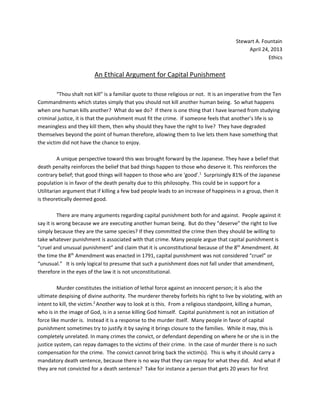
An Ethical Argument for Capital Punishment
- 1. Stewart A. Fountain April 24, 2013 Ethics An Ethical Argument for Capital Punishment “Thou shalt not kill” is a familiar quote to those religious or not. It is an imperative from the Ten Commandments which states simply that you should not kill another human being. So what happens when one human kills another? What do we do? If there is one thing that I have learned from studying criminal justice, it is that the punishment must fit the crime. If someone feels that another’s life is so meaningless and they kill them, then why should they have the right to live? They have degraded themselves beyond the point of human therefore, allowing them to live lets them have something that the victim did not have the chance to enjoy. A unique perspective toward this was brought forward by the Japanese. They have a belief that death penalty reinforces the belief that bad things happen to those who deserve it. This reinforces the contrary belief; that good things will happen to those who are 'good'.1 Surprisingly 81% of the Japanese population is in favor of the death penalty due to this philosophy. This could be in support for a Utilitarian argument that if killing a few bad people leads to an increase of happiness in a group, then it is theoretically deemed good. There are many arguments regarding capital punishment both for and against. People against it say it is wrong because we are executing another human being. But do they “deserve” the right to live simply because they are the same species? If they committed the crime then they should be willing to take whatever punishment is associated with that crime. Many people argue that capital punishment is “cruel and unusual punishment” and claim that it is unconstitutional because of the 8th Amendment. At the time the 8th Amendment was enacted in 1791, capital punishment was not considered “cruel” or “unusual.” It is only logical to presume that such a punishment does not fall under that amendment, therefore in the eyes of the law it is not unconstitutional. Murder constitutes the initiation of lethal force against an innocent person; it is also the ultimate despising of divine authority. The murderer thereby forfeits his right to live by violating, with an intent to kill, the victim.2 Another way to look at is this. From a religious standpoint, killing a human, who is in the image of God, is in a sense killing God himself. Capital punishment is not an initiation of force like murder is. Instead it is a response to the murder itself. Many people in favor of capital punishment sometimes try to justify it by saying it brings closure to the families. While it may, this is completely unrelated. In many crimes the convict, or defendant depending on where he or she is in the justice system, can repay damages to the victims of their crime. In the case of murder there is no such compensation for the crime. The convict cannot bring back the victim(s). This is why it should carry a mandatory death sentence, because there is no way that they can repay for what they did. And what if they are not convicted for a death sentence? Take for instance a person that gets 20 years for first